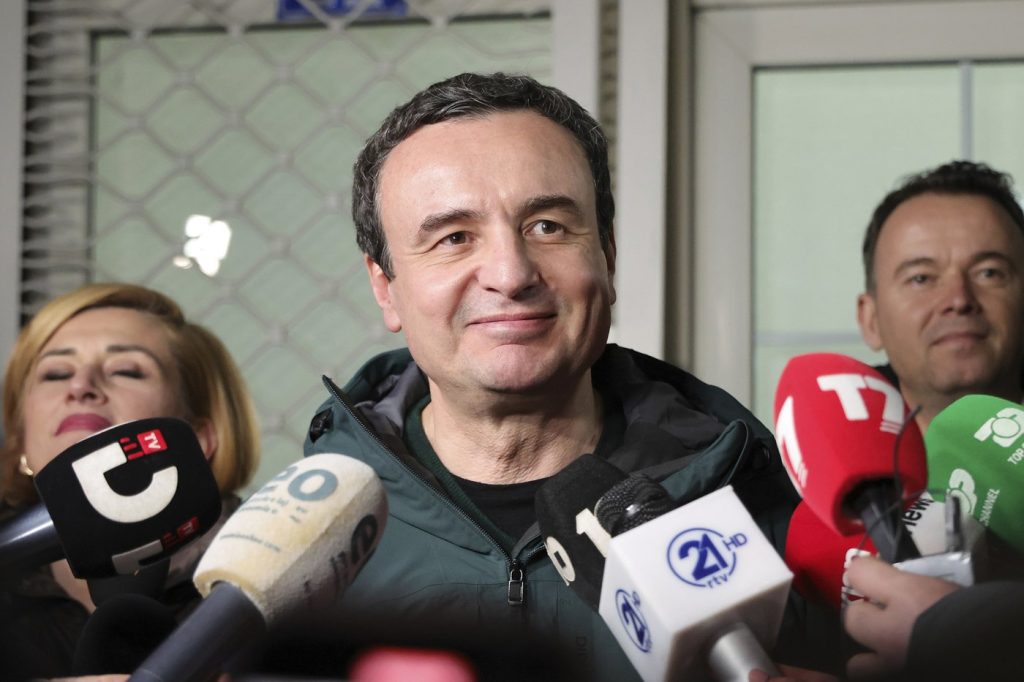PRISTINA, Kosovo (AP) — Kosovo Prime Minister Albin Kurti's leftist party, the Self-Determination Movement (Vetevendosje!), emerged as the leading force in the parliamentary election held on Sunday, garnering 40.94% of the votes according to preliminary results announced on Monday. Despite this electoral success, Vetevendosje! fell short of obtaining a majority in the 120-seat parliament, compelling Kurti to seek coalition partners to form the next government.
This election is significant as it marks the first time since Kosovo's independence in 2008 that the parliament completed a full four-year mandate. It represents the ninth parliamentary vote since the conclusion of the 1998-1999 war between Serbian forces and ethnic Albanian separatists. Serbia remains steadfast in not recognizing Kosovo's independence, which further complicates political dynamics.
The Democratic Party of Kosovo (PDK), currently facing legal challenges with its main leaders detained on war crimes accusations, secured 22.11% of the vote. Following closely behind is the Democratic League of Kosovo (LDK), the country’s oldest political party, with 17.67%. The Alliance for Kosovo's Future, led by former Prime Minister Ramush Haradinaj, received 7.44%. Kurti, while celebrating the results, indicated that coalition-building talks remain unspecified.
Kurti expressed confidence, stating, "The people won. Vetevendosje! won. We are the winners who will form the next Cabinet," during celebrations in Pristina. Voter turnout stood at 40.6%, approximately 7% lower than the previous election, reflecting a diminished electoral engagement.
As Kosovo navigates its political future, significant challenges lie ahead. The U.S. has frozen foreign aid to the country, while the European Union has suspended funding for certain projects in recent years. Kurti must also confront pressing domestic issues, including demands for increased public salaries, improved education and health services, and ongoing poverty alleviation efforts. With a population of about 1.6 million, Kosovo remains one of Europe’s poorest nations, reporting an annual gross domestic product of under €6,000 (approximately $6,200) per person.
In anticipation of his new term, Kurti will likely aim to mend relations with Western powers, which have deteriorated following policies that raised tensions with Serbia and the ethnic Serb population in Kosovo. Measures such as a ban on the use of the Serbian dinar and restrictions on dinar transfers have heightened tensions, drawing international concern.
The EU's ambassador to Kosovo, Aivo Orav, stressed the importance of the new government meeting public expectations, as many citizens associate the EU with human rights, the rule of law, and improved living standards. He emphasized the necessity of reforms for Kosovo to secure the support of the EU in its quest for membership.
In the recent election, the Srpska Lista, the main party representing Kosovo's ethnic Serb community, received 4.33% of the vote, maintaining a stable yet slightly decreased position since the last election. The leader of Srpska Lista, Zlatan Elek, expressed gratitude for the support received from Serbia's President Aleksandar Vucic.
Security remains a priority, with the NATO-led KFOR having bolstered its presence in Kosovo amid rising tensions. The election was monitored by a substantial team of international observers, ensuring a degree of transparency in the process.
As Kosovo embarks on this new political journey, all eyes remain on coalition negotiations and the government's ability to address both internal challenges and the complex relationship with Serbia.











